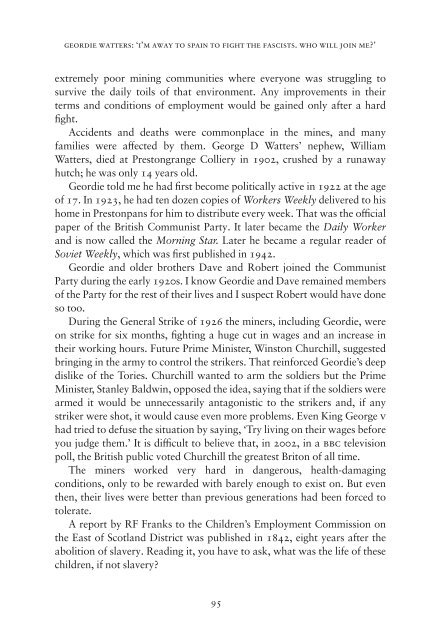Our Fathers Fought Franco by Willy Maley sampler
resonant piece of working class history, this book is a living link to four extraordinary stories. Why did these young men put their lives on the line and go to Spain to fight with the International Brigades? How did they all end up in the same prison cell? And what is their legacy today? James Maley, George Watters, Donald Renton and Archibald Williams were members of Machine Gun Company No. 2 of the XV International Brigade. This is the first book to focus on a small group of men who, from different starting-points, ended up on the same battleground at Jarama, and then in the same prisons after capture by Franco’s forces. Their remarkable story is told both in their own words and in the recollections of their sons and daughters, through a prison notebook, newspaper reports, stills cut from newsreels, interviews, anecdotes and memories, with a foreword by Daniel Gray. Our Fathers Fought Franco is a collective biography that promises to add significantly to the understanding of the motives of those who ‘went because their open eyes could see no other way’.
resonant piece of working class history, this book is a living link to four extraordinary stories. Why did these young men put their lives on the line and go to Spain to fight with the International Brigades? How did they all end up in the same prison cell? And what is their legacy today?
James Maley, George Watters, Donald Renton and Archibald Williams were members of Machine Gun Company No. 2 of the XV International Brigade. This is the first book to focus on a small group of men who, from different starting-points, ended up on the same battleground at Jarama, and then in the same prisons after capture by Franco’s forces.
Their remarkable story is told both in their own words and in the recollections of their sons and daughters, through a prison notebook, newspaper reports, stills cut from newsreels, interviews, anecdotes and memories, with a foreword by Daniel Gray.
Our Fathers Fought Franco is a collective biography that promises to add significantly to the understanding of the motives of those who ‘went because their open eyes could see no other way’.
Create successful ePaper yourself
Turn your PDF publications into a flip-book with our unique Google optimized e-Paper software.
Geordie Watters: ‘I’m away to Spain to fight the fascists. Who will join me?’<br />
extremely poor mining communities where everyone was struggling to<br />
survive the daily toils of that environment. Any improvements in their<br />
terms and conditions of employment would be gained only after a hard<br />
fight.<br />
Accidents and deaths were commonplace in the mines, and many<br />
families were affected <strong>by</strong> them. George D Watters’ nephew, William<br />
Watters, died at Prestongrange Colliery in 1902, crushed <strong>by</strong> a runaway<br />
hutch; he was only 14 years old.<br />
Geordie told me he had first become politically active in 1922 at the age<br />
of 17. In 1923, he had ten dozen copies of Workers Weekly delivered to his<br />
home in Prestonpans for him to distribute every week. That was the official<br />
paper of the British Communist Party. It later became the Daily Worker<br />
and is now called the Morning Star. Later he became a regular reader of<br />
Soviet Weekly, which was first published in 1942.<br />
Geordie and older brothers Dave and Robert joined the Communist<br />
Party during the early 1920s. I know Geordie and Dave remained members<br />
of the Party for the rest of their lives and I suspect Robert would have done<br />
so too.<br />
During the General Strike of 1926 the miners, including Geordie, were<br />
on strike for six months, fighting a huge cut in wages and an increase in<br />
their working hours. Future Prime Minister, Winston Churchill, suggested<br />
bringing in the army to control the strikers. That reinforced Geordie’s deep<br />
dislike of the Tories. Churchill wanted to arm the soldiers but the Prime<br />
Minister, Stanley Baldwin, opposed the idea, saying that if the soldiers were<br />
armed it would be unnecessarily antagonistic to the strikers and, if any<br />
striker were shot, it would cause even more problems. Even King George V<br />
had tried to defuse the situation <strong>by</strong> saying, ‘Try living on their wages before<br />
you judge them.’ It is difficult to believe that, in 2002, in a BBC television<br />
poll, the British public voted Churchill the greatest Briton of all time.<br />
The miners worked very hard in dangerous, health-damaging<br />
conditions, only to be rewarded with barely enough to exist on. But even<br />
then, their lives were better than previous generations had been forced to<br />
tolerate.<br />
A report <strong>by</strong> RF Franks to the Children’s Employment Commission on<br />
the East of Scotland District was published in 1842, eight years after the<br />
abolition of slavery. Reading it, you have to ask, what was the life of these<br />
children, if not slavery?<br />
95


















